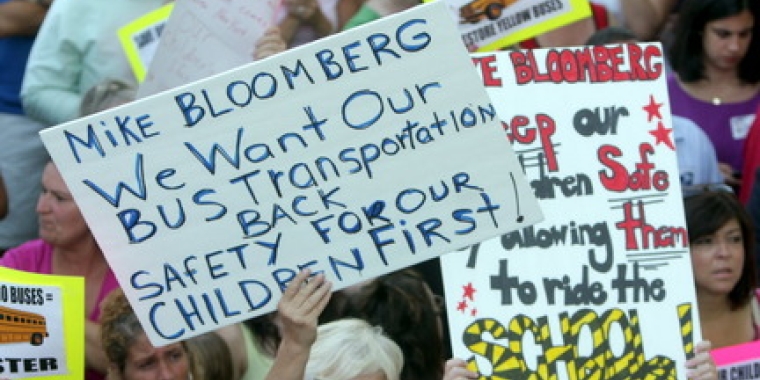
Analysis: City's lack of planning evident in yellow bus cuts trial

The Island busing variance almost exclusively affects the South Shore, an area where infrastructure has not kept up with the population boom. Many communities in the district still don't have sewers, many roads have no sidewalks, and historical MTA maps show there are actually fewer bus routes there now then there were 40 years ago. Bloomberg himself decried the MTA's 'neglect' of the Island during his re-election campaign a year ago. (Advance file photo)
From the Staten Island Advance:
http://blog.silive.com/latest_news/print.html?entry=/2010/09/analysis_citys_lack_of_plannin.html
STATEN ISLAND, N.Y. -- Maybe they thought it was a simple matter of equity.
There are more than 125,000 seventh and eighth grade students in the New York City schools, but only one borough received a special waiver to bus those children. That just didn't seem fair.
Or maybe it was just as easy as removing a line item in the budget.
Whatever the Department of Education (DOE) officials had been thinking when they decided to eliminate a variance for 3,000 Staten Island students, they had almost certainly not planned for this. Not for this ugly public battle with elected officials and angry parents, not for an even uglier and embarrassing lawsuit trial that is pulling back the curtain to reveal a dysfunctional bureaucracy.
They did not anticipate they would be forced to explain their decision to state Supreme Court Justice John Fusco, a former Mid-Island City Councilman who seems to have lost none of the brio he displayed during his own battles with big city government.
They did not plan to have some of the highest-ranking city officials portrayed on the stand as villains or bumbling bureaucrats.
And it certainly was not part of the plan that the mayor who wants his legacy to be education may now be remembered by the borough that supported him most as the mayor who took away school buses.
The Island busing variance almost exclusively affects the South Shore, an area where infrastructure has not kept up with the population boom. Many communities in the district still don't have sewers, many roads have no sidewalks, and historical MTA maps show there are actually fewer bus routes there now then there were 40 years ago. Bloomberg himself decried the MTA's "neglect" of the Island during his re-election campaign a year ago.
But DOE officials apparently think the Island's transportation woes are just an urban legend. Matthew Berlin, executive director of the agency Office of Pupil Transportation, summed up that attitude in a May 13 e-mail to his boss, CEO of School Support Services Eric Goldstein, when he wrote the "lack of public transit has always been acknowledged as a made up reason to cover giving a benefit to a powerful part of the city."
Goldstein and most other DOE officials who testified last week echoed that sentiment -- which seems to beg the question: If they believe the South Shore has so much political clout, shouldn't they have anticipated a big fight on their hands over the bus variance?
If they had, they would have dotted all of their i's and crossed all of their t's to back up their decision before it was made. They would have conducted a study, performed an analysis, created graphs or charts. The best evidence of any forethought they could provide during trial was MTA bus maps of Staten Island, with inaccurate scales. DOE officials also should have made sure they were all on the same page about how much they will save by eliminating seventh and eighth grade busing -- is it $6.87 million, $3.4 million or $1.6 million? -- and who made the decision and why.
That preparation would have helped the city fight a lawsuit filed by the Island's City Council members and parents, who claim the decision was "arbitrary and capricious."
So far, the DOE has not done much to help its case. All they have seem to have done is try Fusco's patience. On several occasions, the animated judge berated the city's attorneys for delaying the case with constant objections, and the witnesses for being "evasive" and vague.
He suggested several times the city attorneys would rather "hang out" in the Appeals Court (referring to their attempts to overturn his rulings and have the case squashed) rather than try the case in his court; at one point, he began to take off his judge's robe and ask the attorneys if they'd like to do his job; he told a city attorney arguing a legal point to "wipe the smirk off her face" and sit down; he even objected to an attorney's objection.
"I object to your standing up and answers being given to this court that are not directly in response to the question it is asking," Fusco said.
The trial continues this week, and most likely will head back to Appeals Court after Fusco renders his decision. However, no one who has closely followed this issue thinks that will be the end of it.
Even if the DOE's decision to eliminate the busing variances is ultimately overturned by the courts, it can make the same decision again next year -- because there are no laws or regulations that require the city to bus seventh and eighth-graders.
Maybe then they will plan better.



